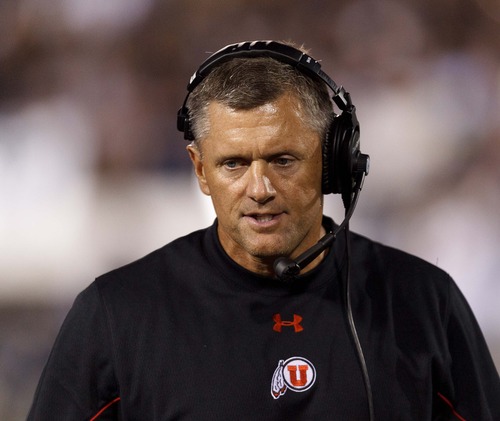This is an archived article that was published on sltrib.com in 2013, and information in the article may be outdated. It is provided only for personal research purposes and may not be reprinted.
On that June afternoon in 2010 when Rose Bowl organizers delivered flowers to the University of Utah's president at Rice-Eccles Stadium, welcoming the Utes into the Pac-12 Conference, this became the inevitable question: When will the novelty wear off?
That's worth asking now.
So is this: Am I the only one who overestimated Utah's ability to win a bunch of Pac-12 football games, right from the start?
In two seasons, the Utes have gone 7-11 in conference play, including 3-7 against Pac-12 South rivals. They're 2-10 against schools that chose to retain their coaches after those seasons, which suggests the Utes should be very thankful for the mismanagement of other programs.
Unfortunately for Utah, the South's coaching changes have achieved their purposes so far. And now, the scheduling rotation will force the Utes to play North powers Oregon and Stanford — for the next six years, in the case of the Ducks.
There's hope for Utah, certainly. The Utes have tremendous support, with sellout crowds at Rice-Eccles and enough potential donors that athletic administrators could launch a $150 million capital campaign last year. The football program's new $32 million complex is evidence of the school's commitment. And coach Kyle Whittingham is determined to fix the offense, having hired the highly regarded Dennis Erickson as co-coordinator.
The immediate issue is whether Erickson's impact and some consistent quarterbacking are sufficient to solve Utah's problems. In the future, upgraded facilities, budgeting and recruiting may bring the Utes closer to the Pac-12's elite programs.
But I never imagined that Utah's winning even half of its conference games would be this difficult.
Obviously, the 7-3 record vs. current Pac-12 members that Urban Meyer and Whittingham compiled from 2003-09 was deceiving. It's true that in their 11 conference losses of the past two seasons, the Utes were overwhelmed only once, in a 37-7 defeat at Arizona State last September. Yet they've failed to deliver any significant road wins or memorable upsets.
They caught the South in temporary disarray in 2011, with USC's sanctions and the struggles of Arizona and UCLA offering the Utes a chance to qualify for the conference championship game. But they blew it by losing at home to Colorado, and who knows when the next opportunity may come?
I mean, if Utah can't win a Pac-12 title in gymnastics, how could it ever happen in football?
The blessing of all this is the Utes unintentionally have succeeded in lowering expectations. By going 15-15 in his last 30 games, Whittingham has distanced himself from the Sugar Bowl season of 2008. He's also made qualifying for a bowl game seem like an achievement after last year's 5-7 record.
Believe me, I love having Pac-12 teams come to town. I once was a coach's kid in this league, at Oregon State. Utah's membership is the most significant sports development in this state since the Jazz's arrival. But at some point, the Utes will have to win a sufficient number of conference games to maintain a high level of interest, won't they?
As the years go by, some sort of sliding scale will come into play. That's why this season already is critical to Whittingham and the Utes. Just wearing Pac-12 patches on their jerseys is not good enough anymore.
In baseball and softball, Utah's Bill Kinneberg and Amy Hogue did some of the Pac-12's best coaching this season, but their teams still finished last in the league. Whittingham must have more to show for his team's improvement in 2013.
The Utes absolutely have to play football in December. Otherwise, they'll risk having fewer people care about them the following September.
Twitter: @tribkurt



